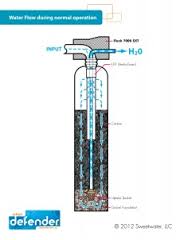A backwashing whole house water filter that backwashes is better than an upflow filter. This article is intended to clarify the difference between my Urban Defender, a backwashing whole house carbon filter system and those systems that do not backwash. The latter cost less but also deliver less.
The backwash function on a whole house water filter cleans and redistributes the media bed on a consistent basis at a specified flow rate for the proper duration. The backwash also removes media fines to the drain. Proper back wash helps to provide consistent flow, increased contaminant removal and longer media life.
An upflow filter with no backwash results in inconsistent, typically inadequate flow to keep the media bed clean. An Upflow system is designed such that the water flows up through the media, theoretically eliminating the need for backwash while also providing a system that costs less. But by lifting the media during service there is necessarily less contact between all of the water and the media resulting in reduced performance. In other words, water can float past the carbon without touching it. Some of this issue can be alleviated by manually backflushing an Upflow system on a periodic basis, but then that is the point of having an automated backwash cycle.
The upflow design will also result in media fines being lifted up and passing through top screen and into the home. With a backwash system, the fines are flushed to the drain. A sediment filter on both the inlet and outlet of the upflow filter can reduce fines entering the home but will likely clog and reduce water pressure.
From a more technical perspective the media inside of a backwashing filter will be compacted as the water flows down through the media. This provides greater contact between the water and the media. In an Upflow system the water flows up through the media and the media is at least somewhat suspended in the water, depending on the flow rate. When the bed is fluidized in this way, water can easily pass around the carbon resulting in poor contact. When water is forced to pass through a compacted bed, the contact is far more intimate and effective.
A backwashing whole house water filter that backwashes is better than an upflow filter.
Backwashing provides the needed time and flow to re-classify the media bed on a periodic basis. In other words, the backwash cycle is deliberately designed to first lift, shuffle, and then resettle the media. This can be daily, weekly or even monthly is usually adequate. The backwash cycle forces the water to establish new pathways through the media allowing for an even flow, exposing the water to fresh carbon. This results in more contact and thus, more contaminant removal. Without periodic backwash, the water will find paths of least resistance through the media bed and continually follow through those paths. We call this “channeling.” This channeling exhausts the carbon in that path at an accelerated rate.
The following video first shows sand at the bottom of a tank of water. In a backwashing carbon system the water would be flowing down through the media, forced to make its way through the densely compacted media. In other words, the water cannot avoid contact with the media. This video shows that media being lifted by the backwash function. The media is entirely reshuffled and then settles back down to the bottom of the tank, exposing new surfaces to any incoming water. Watch a backwash in action:
On the other hand, an upflow filter is in this constant state of backwash when water is turned on in the home. As you can see from the video it is possible for individual streams of water to totally pass individual particles of media thus avoiding removal of contaminants. The video shows a full backwash flow rate whereas an upflow filter will often be flowing at lower rates due to whatever faucet or appliance in the house is being used.
Thus, I hope to have pointed out that a backwashing system will provide you with the best whole house water filter because you will have greater contaminant removal and a longer media life than its less expensive upflow alternative. In water treatment the old adage ‘You get what you pay for’ is always true. If I felt good about upflow carbon systems I would be selling you one.
To learn more about Sweetwater’s Urban Defender whole house water filter, you can email me for detailed specifications and pricing from my website or pick up the phone and give me a call: 866-691-4214 between the hours of 9 AM and 6 PM Mountain time.






